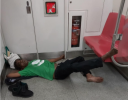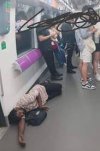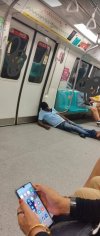https://sg.news.yahoo.com/disruptive-bus-passengers-those-play-145727239.html

Tue, 14 October 2025 at 10:57 pm SGT
4 min read

Those who breach regulations will face penalties in line with how their behaviour affects other bus passengers, with higher penalties for repeat offenders.
SINGAPORE – Disruptive and inconsiderate bus passengers, such as those who litter or cause a nuisance to others by playing loud music, are set to be penalised under new laws passed on Oct 14.
Senior Minister of State for Transport Murali Pillai said in Parliament that the Government intends to regulate the conduct of passengers to prevent inconsiderate behaviour on public buses and at bus interchanges. He cited examples such as eating and drinking, as well as playing loud music and videos on mobile phones.
Those who breach regulations will face penalties in line with how their behaviour affects other bus passengers, with higher penalties for repeat offenders, Mr Murali told the House.
The regulations will be made later and take reference from the Rapid Transit Systems Act, Mr Murali said during the debate on the Transport Sector (Miscellaneous Amendments) Bill.
In March, then Senior Parliamentary Secretary for Transport Baey Yam Keng had said in Parliament that the Government’s powers to manage commuter behaviour on board buses were more limited than for rail. The regulatory framework against inconsiderate behaviour will be aligned across buses and trains by 2026, he added.
The Bill passed on Oct 14 will also allow the authorities to conduct security checks on passengers on public buses and at bus interchanges.
Passengers who refuse to comply with checks, which could include frisk searches and putting their belongings through an X-ray machine, can be asked to leave the premises and fined up to $1,000.
These amendments to the Bus Services Industry Act are part of the Government’s efforts to make the public transport system more secure, said Mr Murali.
The powers to stop and search passengers at public transport nodes are already provided for in the Road Traffic Act and the Rapid Transit Systems Act.
With these changes, authorised officers such as Land Transport Authority (LTA) enforcement officers and public transport staff will be able to better protect members of the public at bus depots, interchanges and on public buses, said Mr Murali.
However, public transport workers should not be bogged down with passenger screening, said Ms Yeo Wan Ling (Punggol GRC), who is also executive secretary of the National Transport Workers’ Union.
“Their primary duty is – and must remain – to operate our public transport system,” she said, adding that security checks should be done by trained personnel. Where bus drivers are expected to support these efforts, procedures should be “clear, simple and practical”.
Ms Yeo noted that the Bill includes penalties against anyone who risks the safety of passengers on buses and at interchanges. She asked if this extends to the abuse of public transport workers.
Replying, Mr Murali said the Government intends to issue new regulations that will allow LTA enforcement officers to take stern action against passengers who abuse public transport workers. These will be announced later.
Ms Joan Pereira (Tanjong Pagar GRC) called for “special attention” to be placed on training officers to handle vulnerable commuters such as the elderly, and those with disabilities or with mental health challenges.
Mr Murali assured her that officers will be trained to carry out their duties professionally and with sensitivity towards more vulnerable groups.
Workers’ Party MP Dennis Tan (Hougang) asked how the LTA will ensure that security checks do not cause disproportionate delays to passengers. “How can we avoid creating unnecessary tension, given passenger loads during peak times?”
Mr Murali said each search takes less than a minute, and that passengers have been “generally understanding and cooperative”.
Security checks are “a necessary deterrence” as public transport nodes are attractive targets for terrorists, he added.
Mr Ang Wei Neng (West Coast-Jurong West GRC) said the Government should set aside a portion of the revenue it collects from certificate of entitlement (COE) premiums to improve the public transport system, such as by offsetting a portion of the annual fare increase, and to fund the renewal of bus and train assets.
In response, Mr Murali said the Government looks at the needs across different sectors to maximise the impact of its spending. The public transport sector is a key area for investment, and substantial operating subsidies of $2 billion are already provided every year, he added.
Other changes under the Bill include allowing the Public Transport Council to grant applications by bus operators to withdraw money they deposited into the Fuel Equalisation Fund, established in 1992 to help operators manage fuel price volatility.
This will allow bus operators to withdraw money that they had contributed to the fund over the years before contributions were suspended.
Disruptive bus passengers, like those who play loud music, to be penalised for causing nuisance
Vanessa Paige ChelvanTue, 14 October 2025 at 10:57 pm SGT
4 min read

Those who breach regulations will face penalties in line with how their behaviour affects other bus passengers, with higher penalties for repeat offenders.
SINGAPORE – Disruptive and inconsiderate bus passengers, such as those who litter or cause a nuisance to others by playing loud music, are set to be penalised under new laws passed on Oct 14.
Senior Minister of State for Transport Murali Pillai said in Parliament that the Government intends to regulate the conduct of passengers to prevent inconsiderate behaviour on public buses and at bus interchanges. He cited examples such as eating and drinking, as well as playing loud music and videos on mobile phones.
Those who breach regulations will face penalties in line with how their behaviour affects other bus passengers, with higher penalties for repeat offenders, Mr Murali told the House.
The regulations will be made later and take reference from the Rapid Transit Systems Act, Mr Murali said during the debate on the Transport Sector (Miscellaneous Amendments) Bill.
In March, then Senior Parliamentary Secretary for Transport Baey Yam Keng had said in Parliament that the Government’s powers to manage commuter behaviour on board buses were more limited than for rail. The regulatory framework against inconsiderate behaviour will be aligned across buses and trains by 2026, he added.
The Bill passed on Oct 14 will also allow the authorities to conduct security checks on passengers on public buses and at bus interchanges.
Passengers who refuse to comply with checks, which could include frisk searches and putting their belongings through an X-ray machine, can be asked to leave the premises and fined up to $1,000.
These amendments to the Bus Services Industry Act are part of the Government’s efforts to make the public transport system more secure, said Mr Murali.
The powers to stop and search passengers at public transport nodes are already provided for in the Road Traffic Act and the Rapid Transit Systems Act.
With these changes, authorised officers such as Land Transport Authority (LTA) enforcement officers and public transport staff will be able to better protect members of the public at bus depots, interchanges and on public buses, said Mr Murali.
However, public transport workers should not be bogged down with passenger screening, said Ms Yeo Wan Ling (Punggol GRC), who is also executive secretary of the National Transport Workers’ Union.
“Their primary duty is – and must remain – to operate our public transport system,” she said, adding that security checks should be done by trained personnel. Where bus drivers are expected to support these efforts, procedures should be “clear, simple and practical”.
Ms Yeo noted that the Bill includes penalties against anyone who risks the safety of passengers on buses and at interchanges. She asked if this extends to the abuse of public transport workers.
Replying, Mr Murali said the Government intends to issue new regulations that will allow LTA enforcement officers to take stern action against passengers who abuse public transport workers. These will be announced later.
Ms Joan Pereira (Tanjong Pagar GRC) called for “special attention” to be placed on training officers to handle vulnerable commuters such as the elderly, and those with disabilities or with mental health challenges.
Mr Murali assured her that officers will be trained to carry out their duties professionally and with sensitivity towards more vulnerable groups.
Workers’ Party MP Dennis Tan (Hougang) asked how the LTA will ensure that security checks do not cause disproportionate delays to passengers. “How can we avoid creating unnecessary tension, given passenger loads during peak times?”
Mr Murali said each search takes less than a minute, and that passengers have been “generally understanding and cooperative”.
Security checks are “a necessary deterrence” as public transport nodes are attractive targets for terrorists, he added.
Mr Ang Wei Neng (West Coast-Jurong West GRC) said the Government should set aside a portion of the revenue it collects from certificate of entitlement (COE) premiums to improve the public transport system, such as by offsetting a portion of the annual fare increase, and to fund the renewal of bus and train assets.
In response, Mr Murali said the Government looks at the needs across different sectors to maximise the impact of its spending. The public transport sector is a key area for investment, and substantial operating subsidies of $2 billion are already provided every year, he added.
Other changes under the Bill include allowing the Public Transport Council to grant applications by bus operators to withdraw money they deposited into the Fuel Equalisation Fund, established in 1992 to help operators manage fuel price volatility.
This will allow bus operators to withdraw money that they had contributed to the fund over the years before contributions were suspended.





